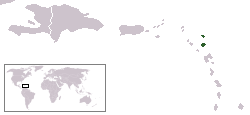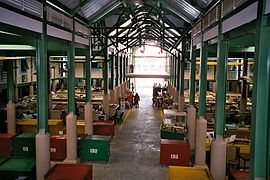
Antigua and Barbuda is a sovereign island country in the West Indies in the Americas, lying between the Caribbean Sea and the Atlantic Ocean. It consists of two major islands, Antigua and Barbuda separated by around 40 km (25 mi), and smaller islands. The permanent population number is about 97,120, with 97% residing on Antigua. The capital and largest port and city is St. John's on Antigua, with Codrington being the largest town on Barbuda. Lying near each other, Antigua and Barbuda are in the middle of the Leeward Islands, part of the Lesser Antilles, roughly at 17°N of the equator.

St. John's is the capital and largest city of Antigua and Barbuda, part of the West Indies in the Caribbean Sea. With a population of 22,219, St. John's is the commercial centre of the nation and the chief port of the island of Antigua.
The history of Antigua and Barbuda covers the period from the arrival of the Archaic peoples thousands of years ago to the present day. Prior to European colonization, the lands encompassing present-day Antigua and Barbuda were inhabited by three successive Amerindian societies. The island was claimed by England, who settled the islands in 1632. Under English/British control, the islands witnessed an influx of both Britons and African slaves migrate to the island. In 1981, the islands were granted independence as the modern state of Antigua and Barbuda.

Barbuda is a small island located in the eastern Caribbean forming part of the sovereign Commonwealth nation of Antigua and Barbuda. It is located north of the island of Antigua and is part of the Leeward Islands of the West Indies. Antigua and Barbuda gained full independence on 1 November 1981 as a constitutional monarchy within the Commonwealth of Nations. The island is a popular tourist destination because of its moderate climate and coastline.
Antigua and Barbuda's transport systems include both public and privately run services. Roads in the country are paved and follow a winding and gently sloping course connecting parishes to villages and communities. Driving is on the left-hand side. The speed limit is set at 40 mph, Traffic signs posted throughout main roads in Antigua and Barbuda allow for ease of commute, and with GPS coordinates posted throughout the country, the process of navigation has become even easier.

The following is an alphabetical list of topics related to the nation of Antigua and Barbuda.

Saint John is a civil parish of Antigua and Barbuda, located on the island of Antigua. It had a population of 51,737 in 2011, making it the most populous parish of Antigua and Barbuda. The majority of the population of the parish is located within the country’s capital, St. John’s.

Antigua, also known as Waladli or Wadadli by the native population, is an island in the Lesser Antilles. It is one of the Leeward Islands in the Caribbean region and the main island of the country of Antigua and Barbuda. Antigua and Barbuda became an independent state within the Commonwealth of Nations on 1 November 1981.

The statistics for Islam in Antigua and Barbuda estimate a total Muslim population of about 200, representing 0.3 percent of the total population of 67,448. Most of the Muslims of the islands are Arabs of Syrian or Lebanese descent. There are two known Islamic organizations in St. John's, including the Antigua and Barbuda International Islamic Society and the American University of Antigua Muslim Students Association. There is also an Ahmadiyya mission in Antigua. Outside St. John's, there is the Muslim Community of Antigua and Barbuda in Codrington, Barbuda. A Pew Research Center survey in 2016 calculated the total number to be around 950.
The Caribbean Cup was the championship tournament for national association football teams that are members of the Caribbean Football Union.
The 1997 Caribbean Cup was the ninth edition of the Caribbean Cup hosted by Antigua and Barbuda and Saint Kitts and Nevis.
The 1998 Caribbean Cup was the tenth edition of the Caribbean Cup hosted by Jamaica and Trinidad and Tobago.

The following outline is provided as an overview of and introduction to Antigua and Barbuda:

The economy of Antigua and Barbuda is service-based, with tourism and government services representing the key sources of employment and income. Tourism accounts directly or indirectly for more than half of GDP and is also the principal earner of foreign exchange in Antigua and Barbuda. However, a series of violent hurricanes since 1995 resulted in serious damage to tourist infrastructure and periods of sharp reductions in visitor numbers. In 1999 the budding offshore financial sector was seriously hurt by financial sanctions imposed by the United States and United Kingdom as a result of the loosening of its money-laundering controls. The government has made efforts to comply with international demands in order to get the sanctions lifted. The dual island nation's agricultural production is mainly directed to the domestic market; the sector is constrained by the limited water supply and labor shortages that reflect the pull of higher wages in tourism and construction. Manufacturing comprises enclave-type assembly for export with major products being bedding, handicrafts, and electronic components. Prospects for economic growth in the medium term will continue to depend on income growth in the industrialized world, especially in the US, which accounts for about one-third of all tourist arrivals. Estimated overall economic growth for 2000 was 2.5%. Inflation has trended down going from above 2 percent in the 1995-99 period and estimated at 0 percent in 2000.
Antigua was discovered by Christopher Columbus, in 1493, and was named after the church of Santa Maria la Antigua in Seville. It was first settled in 1632. By the Treaty of Breda in 1667 it became a British Possession.
The Antigua and Barbuda women's national football team, nicknamed The Benna Girls, is the national women's football team of Antigua and Barbuda and is overseen by the Antigua and Barbuda Football Association, a member of the CONCACAF and the Caribbean Football Union.

Gaston Alfonso Browne is the prime minister of Antigua and Barbuda. He has been its leader since 2014. Before entering politics, he was a banker and businessman.

Antigua and Barbuda has an embassy in Madrid. Spain is accredited to Antigua and Barbuda from its embassy in Kingston, Jamaica.

Antigua and Barbuda and Mexico are members of the Association of Caribbean States, Organization of American States and the United Nations.
Antigua and Barbuda–United Kingdom relations are the relations between the governments of Antigua and Barbuda and the United Kingdom of Great Britain and Northern Ireland (UK). The two countries are related through a long common history spanning from 1632 for Antigua, and 1678 for the smaller sister-isle of Barbuda through until 1981 for the joint-state. Antigua was one of the oldest English settlements in the West Indies, and served as a British hub of regional administration for the surrounding Leeward Islands.














